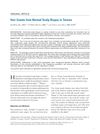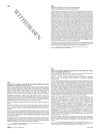 226 citations,
September 2001 in “Journal of The American Academy of Dermatology”
226 citations,
September 2001 in “Journal of The American Academy of Dermatology” Hair loss in women is genetic, diagnosed by examination and biopsy, and treated with minoxidil, finasteride, or transplantation.
28 citations,
June 2010 in “Pediatric dermatology” Short anagen syndrome causes short hair that may grow longer after puberty.
 September 2019 in “Journal of Investigative Dermatology”
September 2019 in “Journal of Investigative Dermatology” Researchers successfully used nude mice to study human hair growth, which could help with future hair research.
 7 citations,
October 2006 in “Medical hypotheses”
7 citations,
October 2006 in “Medical hypotheses” UV light might cause excessive hair growth by increasing PGE2 in the skin.
 53 citations,
January 2007 in “Dermatology”
53 citations,
January 2007 in “Dermatology” Chemotherapy often causes patterned hair loss, with some scalp areas more resistant to hair loss than others.
 August 1994 in “Drugs & Therapy Perspectives”
August 1994 in “Drugs & Therapy Perspectives” Some drugs can cause hair loss or growth, but hair usually returns to normal after stopping the drug.
 January 2019 in “International Journal of Pharmacognosy and Clinical Research”
January 2019 in “International Journal of Pharmacognosy and Clinical Research” Mexican medicinal plants are used to treat hair loss.
 7 citations,
January 1981 in “Springer eBooks”
7 citations,
January 1981 in “Springer eBooks” The document concludes that hair biology is complex and there are still unanswered questions about hair loss and follicle changes.
5 citations,
July 2010 in “Archives of Internal Medicine” Prostaglandins may protect hair follicles during chemotherapy.
September 2021 in “CRC Press eBooks” Erosive pustular dermatosis of the scalp causes painful, scarring skin lesions on the scalp, mainly in elderly people with sun-damaged skin.
 April 2024 in “International journal of research in dermatology”
April 2024 in “International journal of research in dermatology” Azathioprine can cause hair loss and matted hair.
 24 citations,
September 2012 in “Dermatologic Surgery”
24 citations,
September 2012 in “Dermatologic Surgery” The conclusion is that normal scalp hair counts for Taiwanese people were established, showing age-related differences but not sex or scalp location differences.
 January 2018 in “Springer eBooks”
January 2018 in “Springer eBooks” Trichotillomania is a condition where people repeatedly pull out their hair, which can be triggered by stress and has various physical signs.

More research is needed to understand chemotherapy-induced hair loss and its phases.
3 citations,
September 2016 in “Clinical, cosmetic and investigational dermatology” Sphinganine can reduce hair loss and improve scalp health.
June 2022 in “South Florida Journal of Health” Scalp Threading is a promising new treatment for hair loss that may work better than current options.
 28 citations,
September 1998 in “Medical Clinics of North America”
28 citations,
September 1998 in “Medical Clinics of North America” Most hair loss can be diagnosed with patient history and physical exam, and a few common types make up most cases.
 May 2021 in “Pakistan Journal of Medical and Health Sciences”
May 2021 in “Pakistan Journal of Medical and Health Sciences” Trichogram is useful for diagnosing hair disorders, but newer, non-invasive methods like trichoscopy are becoming more popular due to their sensitivity and ability to monitor treatment responses.
 1 citations,
April 2016 in “Journal of The American Academy of Dermatology”
1 citations,
April 2016 in “Journal of The American Academy of Dermatology” The study concludes that Loose Anagen Hair Syndrome is a benign condition that usually improves with age but can be hard to diagnose and stressful for the family.
 27 citations,
September 2012 in “Dermatologic Clinics”
27 citations,
September 2012 in “Dermatologic Clinics” The document concludes that using specific tools and tests is essential for identifying the cause of hair loss and deciding on the right treatment.
January 2022 in “Clinical Cases in Dermatology” Chemotherapy can cause significant but usually reversible hair loss, and managing it involves patient education and hair care strategies.
 January 2016 in “Springer eBooks”
January 2016 in “Springer eBooks” The document concludes that there are various causes and treatments for hair loss, with hair transplantation being a notable option.
 1 citations,
January 2023 in “Journal of Clinical Medicine”
1 citations,
January 2023 in “Journal of Clinical Medicine” A new hair restoration technology was found to effectively increase hair thickness, density, and growth, while reducing hair loss and improving scalp health, with no side effects.
 3 citations,
January 2012 in “Elsevier eBooks”
3 citations,
January 2012 in “Elsevier eBooks” The document says that there are treatments for hair and nail diseases.
 March 2009 in “Medical & surgical dermatology”
March 2009 in “Medical & surgical dermatology” Women with androgenetic alopecia have fewer terminal hairs, phenol in nail surgery is safe, and a new hair transplant method is faster and less damaging.
 March 2021 in “CRC Press eBooks”
March 2021 in “CRC Press eBooks” Hair loss without scarring is more common than permanent hair loss with scarring, and is often due to genetic factors.
 January 2018 in “Figshare”
January 2018 in “Figshare” Horizontal sections of scalp biopsies are useful for telling the difference between Androgenetic Alopecia and Alopecia Areata.
 13 citations,
January 2018 in “BioMed Research International”
13 citations,
January 2018 in “BioMed Research International” Scalp involvement is common in pemphigus and can lead to hair loss, with the severity of scalp lesions linked to overall disease severity.
13 citations,
July 2015 in “Archives of dermatological research” N1-methylspermidine helps hair growth and reduces inflammation in hair follicles.
 4 citations,
March 2015 in “Skin Research and Technology”
4 citations,
March 2015 in “Skin Research and Technology” Trichotillometry is a reliable method to measure hair strength and assess hair loss treatments.























